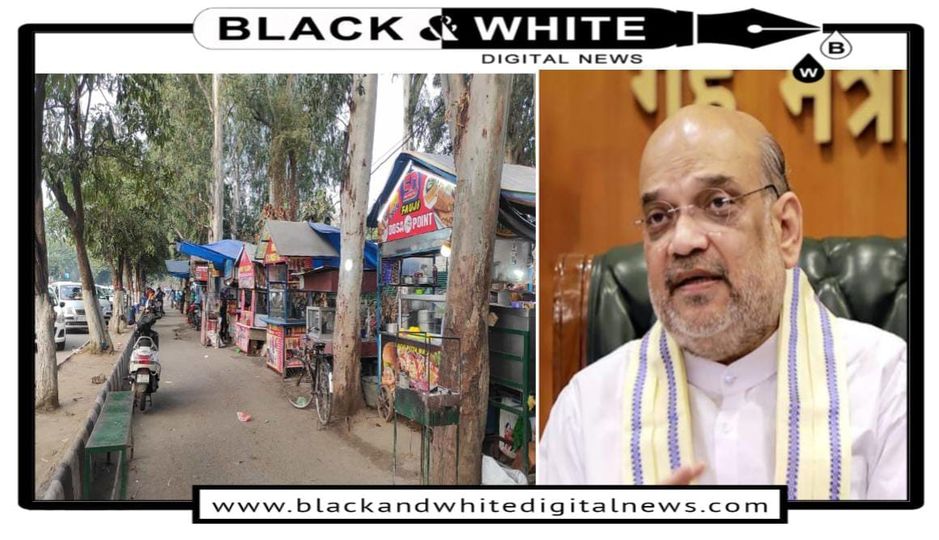VVIP Visits Force Jammu’s Food Stalls and Schools to a Standstill: Over 1,000 Livelihoods and Education in Jeopardy.
||Black and White Digital News ||
||Tejveer Singh September 07,2024 ||
JAMMU : The bustling street opposite Saint Garrison Church and Convent School in Gandhi Nagar, Jammu, famously known as “Chaupati” have fallen silent once again. Food stalls, which are a lifeline for hundreds of families, stand shuttered as the visit of Union Home Minister Amit Shah brings the city to a grinding halt. What is being hailed as a necessary security measure for the high-profile visit has left the livelihoods of over 1,000 individuals hanging by a thread, with ripple effects reaching into the education system and everyday life of ordinary citizens.
For food stall owners stationed opposite the church and school, this is a familiar yet devastating situation. Each time a VVIP such as Prime Minister Narendra Modi or Home Minister Amit Shah comes to the city, orders are issued to close down all roadside stalls for “security reasons.” With their only source of income shut down, these small business owners and their workers are left helpless, unable to feed their families or meet their basic needs. Many of them have no savings to fall back on, meaning these forced closures take a heavy toll on their financial stability.
“Our lives depend on these stalls. Every time there’s a visit, they force us to close down. No compensation, no alternative provided – just orders to shut up shop,” said a frustrated food vendor, whose stall feeds hundreds of students and office-goers on a daily basis.
With 30 VVIPs and star campaigners expected to visit the Jammu region for political campaigning till October, the plight of food stall owners and roadside vendors is set to worsen. Forced closures due to heightened security will push many of these small business owners toward starvation, as their primary source of income comes to a halt. The administration, however, remains tight-lipped about any plans for compensation or relief for these vulnerable workers, leaving them at the mercy of constant disruptions and mounting financial despair. Without intervention, these campaigns will bring hardship and hunger to hundreds of families across the region.
This is not an isolated incident. Each high-profile visit brings with it a trail of hardships for the general public. Traffic routes are altered without notice, leading to heavy jams across the city. Commuters find themselves trapped on roads for hours on end, unable to reach work, appointments, or even hospitals in emergencies. This time around, several schools in the vicinity, were also ordered to close, leaving students stranded and their education disrupted.
Parents have raised serious concerns about how the closure of schools, however brief, negatively impacts their children’s studies. “Education has already suffered due to the pandemic. Now, these visits are creating further disruptions. This has to stop – the education of our children is too important to be treated as an afterthought,” commented a concerned parent outside one of the closed schools.
For the common man, these VVIP visits bring more harm than good. Local businesses shut down, traffic chaos reigns, and essential services are delayed, all while the city’s political elite move through without disruption. There’s growing resentment among the populace, who feel that their lives and livelihoods are being sacrificed in the name of security.
News sources have noted similar trends across the country, particularly in metropolitan areas, where VVIP visits turn into nightmares for common citizens. While the security of these high-profile leaders is undoubtedly important, the question remains: at what cost to the ordinary man? Many argue that better planning and more considerate measures should be put in place to minimize the disruption caused to the general public.
In Jammu, the sight of shut stalls and frustrated citizens is a glaring testament to the adverse effects of VVIP visits. As Amit Shah’s visit causes the city to come to a virtual standstill, the message from the people of Jammu is clear – their lives and livelihoods matter too. The authorities must find a better balance between security and the well-being of its citizens.
With each passing visit, the calls for change are growing louder. Until then, food stall owners, workers, students, and commuters are left to bear the brunt of a system that places the needs of a few over the well-being of the many.



